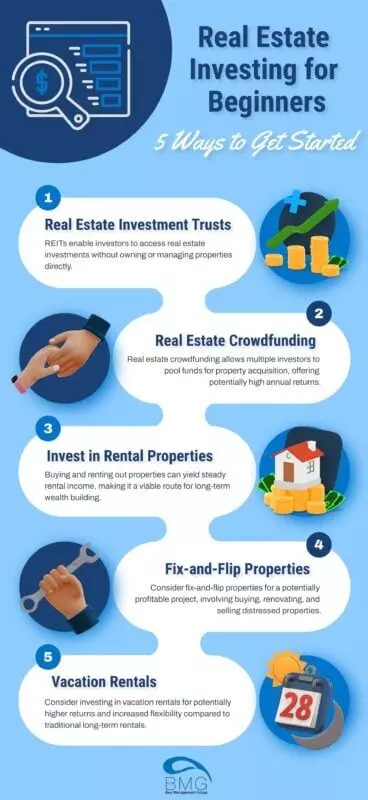Investing in real estate can feel like stepping into a whole new world, full of opportunities and, let's be honest, a touch of uncertainty. But guess what? It doesn't have to be intimidating. This guide is your friendly chat, breaking down the ins and outs of real estate investing, especially for those just starting.
We'll explore the exciting perks of real estate, like the potential for your investment to grow over time and the possibility of earning rental income. Of course, we'll also keep it real and discuss the importance of research, understanding your goals, and being aware of potential risks. Think of this as a friendly heads-up before you jump in!
Ready to get started? We'll unpack five beginner-friendly investment strategies, from REITs to fix-and-flip projects, so you can choose the path that aligns with your goals. Plus, we'll share some tried-and-true tips to help you invest wisely and manage your investments like a pro.
Let's get started!
Is Real Estate the Right Investment for You?
Real estate has a bit of a reputation for being a solid investment, and for good reason! It has the potential to increase in value over time, and if you choose to rent out a property, it can create a steady stream of passive income. Plus, there can be tax advantages.
But like any good investment, it's not without its considerations. It often requires a decent amount of money upfront, and the market can have its ups and downs. But don't worry, we'll explore these points in detail so you can make informed decisions.
Advantages of Real Estate:
- Appreciation Potential: Historically, real estate tends to increase in value over time.
- Rental Income: Rent out your property for a consistent cash flow.
- Tax Benefits: Enjoy potential tax deductions related to your investment property.
- Diversification: Real estate behaves differently than stocks and bonds, adding a layer of balance to your investment portfolio.
- Control: You have a say in managing and improving your property, which directly impacts its value.
Things to Consider:
- Upfront Costs: Be ready for expenses like a down payment, closing costs, and potential renovations.
- Market Fluctuations: Like any market, real estate has its ups and downs.
- Liquidity: Selling a property takes a bit longer than selling stocks.
- Maintenance and Management: Properties require upkeep, whether you do it yourself or hire a property manager.
- Location, Location, Location: Choosing the right area is key for attracting renters or finding future buyers.
5 Ways to Begin Your Real Estate Investment Journey
You don't need to become a landlord overnight to invest in real estate. Here are five beginner-friendly options:

1. Real Estate Investment Trusts (REITs)
Think of REITs like mutual funds for real estate. You invest in a company that owns and manages income-producing properties, so you're essentially getting a slice of the real estate pie without buying entire properties yourself.
2. Real Estate Crowdfunding
Join forces with other investors to pool money and buy properties together. It's a team effort that can open doors to opportunities you might not have on your own.
3. Rental Properties
This is the classic route – buy a property and rent it out to tenants for a steady stream of income. It's a bit more hands-on, but it allows you to be directly involved in managing your investment.
4. Fix-and-Flip Properties
Got a knack for renovations? Buy undervalued properties, fix them up, and sell them for a profit. It's a faster-paced strategy that requires market knowledge and renovation skills.
5. Vacation Rentals
Tap into the world of short-term rentals by offering a vacation home to travelers. Platforms like Airbnb have made this a popular and potentially lucrative option.
Top Tips for Newbie Investors
- Become a Student of Real Estate: Read books, attend webinars, and learn from experienced investors. Knowledge is power!

- Nurture Your Credit Score: A healthy credit score unlocks better loan rates, which can make a big difference in your real estate ventures.
- Build Your Savings: Having a financial cushion is crucial for handling unexpected expenses and riding out market fluctuations.
- Consider a Partner: Team up with an experienced investor who can guide you and share their expertise.
- Explore All Your Options: Don't limit yourself! Research various investment strategies and find the best fit for your goals and risk tolerance.
Managing Your Investments with Confidence
Real estate investing is an ongoing journey. Whether you're actively managing rental properties or keeping an eye on your REIT portfolio, staying informed and making strategic decisions will help you navigate the market with confidence.











